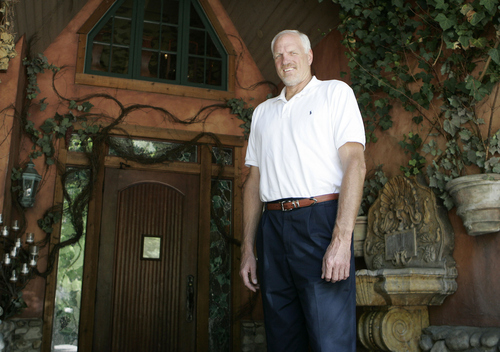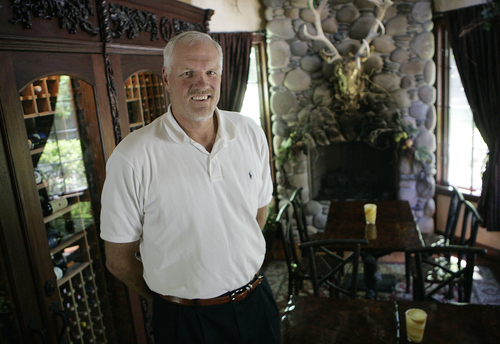This is an archived article that was published on sltrib.com in 2013, and information in the article may be outdated. It is provided only for personal research purposes and may not be reprinted.
Park City • His hairline is receding and the familiar beard that always added to his Paul Bunyan-esque appearance has turned into a graying goatee.
Twenty years after playing his final game for the Utah Jazz, however, Mark Eaton remains a mountain of a man who is living, working and thriving in his adopted home state.
Now 56, Eaton is a partner in the popular Salt Lake City restaurant Tuscany and a motivational speaker, whose built-from-scratch business is booming.
Away from his work, Eaton resides in Park City and owns "a couple of horses," including a 27-year-old favorite named Festus. He also skis "30 or 40 days" every winter, using the sanctuary of Utah's powder-covered slopes as a place to relax, refresh and contemplate.
"For me," Eaton says, "skiing is like going to church."
Retirement from basketball "has been interesting and challenging. You really don't know what you want to do and I had some physical issues to deal with for a few years. But those finally got better and things are going pretty well."
Eaton's remarkable journey from aspiring auto mechanic to one of the most prolific shot-blockers in history has been well-documented.
He was 21 and repairing automobiles in Orange County when he was spotted and persuaded by Cypress College coach Tom Lubin to resume playing a sport he'd grown to dislike.
Eaton ended up at UCLA, where he didn't play much but caught the eye of NBA scouts, primarily because he stood 7-foot-4.
The Jazz selected Eaton in the fourth round of the 1982 draft and, over the next 11 seasons, he became an invaluable part of a team that transitioned from laughingstock to championship contender.
"Mark was an Eagle Scout," said former Jazz coach Frank Layden, "and it's hard to be an Eagle Scout. That tells you a lot about him. When he sets his mind on something, he goes after it. That's what he's always done."
Eaton still ranks fourth on the NBA's all-time list for blocked shots — behind Hakeem Olajuwon, Dikembe Mutombo and Kareem Abdul-Jabbar — though his 3.5 average tops them all. After he became the Jazz's starting center in his second season, the team never missed the playoffs.
What made Eaton so effective?
"He was such a force by the basket," Layden said. "I think a lot of players were completely intimidated by him. People just couldn't take the ball to the board against us."
Eaton missed only 10 games in his first 10 seasons because of injury. But knee surgery and developing back trouble sidelined him for 18 games in 1992-93. He was less than 100 percent most of the year and, by the end, he'd lost feeling in his hip and one leg.
"The miles just piled up and my body was telling me, 'No more,'" said Eaton, who nevertheless spent the offseason searching for a way to continue playing.
Nothing worked.
"I tried everything," he said. "Rehab, the holistic approach — every trick I could think of to get healthy."
Still, with a year remaining on his contract, Eaton reported for training camp. It didn't take long to realize he'd reached the end of his career.
"On the first day, I was out there for about 15 minutes," he said. "Then it was like, 'Yeah, I think we're done here.' ... Honestly, it took a good five or six years for my body to really heal up."
Married at the time with two young sons, Eaton remained in Utah, although Southern California would have been a logical alternative because family and friends lived there.
"We thought about it," he said. "[But] living in Park City was like living a dream. It was so much fun waking up and seeing a moose in your backyard. ... What a great place for the kids to grow up."
Eaton became partners in Tuscany in 1996. He also did TV work for the Jazz, served as the president of the NBA Retired Players Association and founded Standing Tall for Youth — an organization aimed at helping at-risk kids in Utah.
In 2008, Eaton embarked on what has become a flourishing second career as a motivational speaker. He uses the lessons learned in basketball and applies them to the concept of teamwork in business.
Once again, however, Eaton had to start from scratch.
"It was humbling," he said. "I spent 18 months writing my speech, with the help of my coach, and it just kicked my butt. ... It was one of the most painful things I've ever done."
Lisa Yakobi is a Long Island-based speaker coach and speech writer who assisted Eaton in focusing his message.
According to Yakobi, the breakthrough came when she called Lubin, the junior college coach who jump-started Eaton's basketball career.
Lubin told her that Eaton was successful on the court for four reasons: He knew his job, he did what was asked, he protected people and he unselfishly embraced making others look good.
The conversation became the foundation for his motivational message, Four Commitments of a Winning Team.
"After talking to Tom, I told Mark I knew what he needed to share with people," Yakobi said. "... He explains to them the difference between being part of a group and being part of a team. Just simple truths."
Said Eaton: "It's about things we took for granted as a basketball team — things people in business never really think about: protecting your teammate, making other people look good.
"Basketball teams do it naturally, in order to win. But in business, very few people know how to create that atmosphere. That's what I bring to a boardroom, a construction company, whoever the client is."
Of course, identifying his message was one thing. Presenting it was another. So Eaton has worked diligently to refine his speaking skills.
"My instincts as an athlete came out," he said. "I went at it with the same intensity as a basketball player. I tried to figure out how the speaking business works [and] what I had to do to get better. I fumbled a few times but eventually figured it out."
Layden, for one, stopped doubting Eaton a long time ago and takes great satisfaction in seeing him prosper.
"Even going back to my high school and college players, I like to look and see how they did with their lives," Layden said. "The pros are a little different, obviously. But you still want them to succeed after basketball and Mark has certainly done that."
twitter: @sluhm —
Get that outta here
NBA's all-time leaders in blocked shots:
Player Blocks Games Average
1. Hakeem Olajuwon 3,830 1,238 3.09
2. Dikembe Mutombo 3,289 1,196 2.75
3. Kareem Abdul-Jabbar 3,189 1,239 2.57
4. Mark Eaton 3,064 875 3.50
5. David Robinson 2,954 987 2.99
6. Patrick Ewing 2,894 1,183 2.45
7. Shaquille O'Neal 2,732 1,207 2.26
8. Tim Duncan 2,652 1,180 2.25
9. Tree Rollins 2,542 1,156 2.20
10. Robert Parish 2,361 1,611 1.47 —
Mark Eaton File
Born • Jan. 24, 1957
Hometown • Westminster, Calif.
Residence • Park City, Utah
College • UCLA
Height • 7-foot-4
Weight • 290
Career highlights • Selected by the Jazz in the fourth round of the 1982 draft. ... Was the 72nd overall pick. ... Two-time Defensive Player of the Year (1984-85, 1988-89). ... Averaged an NBA-record 5.56 blocks per game during the 1984-85 season. ... Led the league in blocked shots four times. ... Still ranks fourth behind Hakeem Olajuwon, Dikembe Mutombo and Kareem-Abdul-Jabbar on the all-time list for blocked shots with 3,064. ... Jazz retired his jersey (No. 53) on March 1, 1996.





